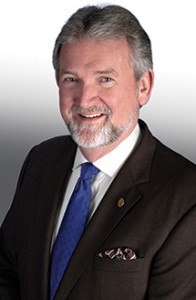Gene N. Herbek, MD
March 2015—Turning points emerge in retrospect, but I’m ready to put a red pushpin at December 2013 on the evolutionary timeline for pathology graduate medical education. Twenty-four pathology education organizations came together that month for a workforce summit sponsored by the CAP, the American Society for Clinical Pathology, the Association of Pathology Chairs, and the United States and Canadian Academy of Pathology that would refine consensus on how to best shape the future of our specialty.

Dr. Herbek
The outcome to date is an annual survey sponsored by the American Board of Pathology in association with its Maintenance of Certification updates for all new-in-practice ABP-certified pathologists. The first iteration—developed by a workforce summit workgroup led by Stephen Black-Schaffer, MD, pathology residency training program director at Massachusetts General Hospital, and David J. Gross, PhD, director of the CAP Policy Roundtable—just wrapped up. ABP chief executive officer Rebecca L. Johnson, MD, says the ABP will use the survey to ensure that certification examination content reflects not only what trainees should learn now but also what they will need to know to prepare them for future practice.
As Suzanne Z. Powell, MD, residency training program director at Houston Methodist Hospital and CAP Graduate Medical Education Committee chair, puts it, a lot of the things that a lot of people have been working on for a long time seem to be coming together. We have a reliable workforce supply-and-demand model and can now focus on educating our trainees in the right areas and in the right proportions to ensure that tomorrow’s pathologists are up to date and prepared to grow in place.
Today’s new pathologists are entering a competitive job market. We know a lot about their expectations from the ASCP Resident In-Service Examination (RISE) survey, but we wanted something equally granular on actual job search results. During the next 15 years, far more pathologists will retire than enter practice just as population age and disease incidence will increase the demand for our services. New technologies and opportunities emerging under accountable care organizations will affect roles and responsibilities of pathologists and other laboratory professionals. The future is bright but we need to be nimble now.
The 2014 RISE survey showed that 56 percent of residents planned to complete one fellowship and another 39 percent were thinking about completing two. Only four percent (48) of all graduating residents had pursued jobs without seeking fellowships, and 29 of those individuals had received at least one job offer. The RISE survey also validated what seems to be the biggest concern of today’s trainees: a need for more graduated responsibility for their cases.
Tracking trainees after residency can be challenging, but graduates do check in for credentials verification when they find a job or need a medical license. In 2013, a group of program directors recognized that they had previously untapped information, and Robert D. Hoffman, MD, PhD, training program director at Vanderbilt University Medical Center, surveyed program directors about the hiring timeline and successful placement of trainees from the 2008–2012 graduating classes. The upshot was that 95 percent of residents had obtained pathology-practice positions within four years of completing residency and about half had secured those positions within 18 months.
The CAP Graduate Medical Education Committee surveyed first-time job seekers who were looking for positions during the 12 months ending June 2014, most of whom, 83 percent, had just graduated. In this group, 66 percent had already accepted a position, and the majority had found positions they liked in regions they wanted to live. Of the 89 percent who were fellowship trained, 25 percent had completed two or more fellowships.
 CAP TODAY Pathology/Laboratory Medicine/Laboratory Management
CAP TODAY Pathology/Laboratory Medicine/Laboratory Management
